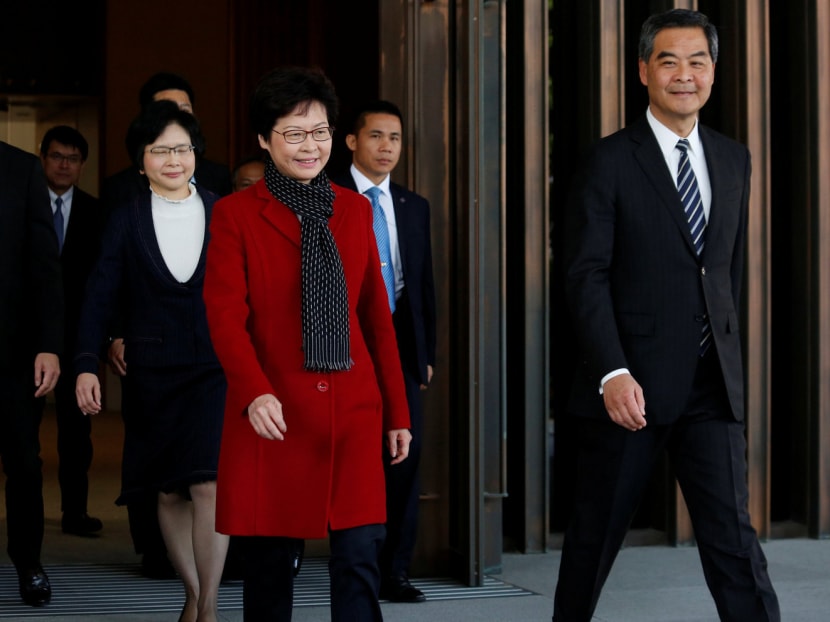HK’s Umbrella Movement protesters face crackdown
HONG KONG — A day after Hong Kong picked a new Beijing-backed leader, police yesterday launched a fresh round of arrests of student leaders and other prominent figures involved with the huge 2014 “Umbrella Movement” pro-democracy protests.

Newly elected Hong Kong Chief Executive Carrie Lam (second from left) with current leader Mr Leung Chun-ying (right) yesterday. Part of the public mistrust towards Mrs Lam stems from her close working relationship with the staunchly pro-Beijing Mr Leung. Photo: Reuters
HONG KONG — A day after Hong Kong picked a new Beijing-backed leader, police yesterday launched a fresh round of arrests of student leaders and other prominent figures involved with the huge 2014 “Umbrella Movement” pro-democracy protests.
Nine activists targeted by police were defiant as they turned themselves in at police headquarters in the evening, accompanied by dozens of supporters. The police notified them earlier in the day that they would be arrested and charged with committing a public nuisance, according to the Demosisto political party.
Hong Kong police, who have arrested more than 200 people for involvement in the protests, did not reply to inquiries. The Department of Justice said police would prosecute nine people based on its legal advice.
The arrests, which come more than two years after the end of the massive protests, could reignite political tensions in Hong Kong as the city prepares for its leadership transfer.
Beijing loyalist Carrie Lam promised to mend political divisions after she was named Hong Kong’s next leader on Sunday, but the arrests have fuelled fears of a wider crackdown on pro-democracy supporters amid rising concerns about mainland China’s tightening grip on the semi-autonomous city.
“We expect a large-scale political prosecution,” tweeted Joshua Wong, the young activist who helped lead the 2014 protests and co-founded Demosisto, one of a new wave of pro-democracy parties that advocate “self-determination” or even independence from China.
Mr Wong has already been taken to court several times for his part in the protests, but is not among those being targeted this time.
Those targeted include two university professors, Benny Tai and Chan Kin-man, and the Reverend Chu Yiu-ming. They founded a civil disobedience campaign that helped spark the 79-day protests demanding free elections for Hong Kong’s leader.
“Today, we are going to be arrested, and we will be charged. We will face very lengthy legal action,” Prof Tai said before entering the police station. “No matter what the results will be, we won’t give up. We will never give up.”
Prof Tai, Prof Chan and Rev Chu each face three charges relating to public nuisance.
Prof Tai also pointed out that some academics say the common law crime of public nuisance shows “prosecutors are eyeing a heavier sentence”. Transferring the case to District Court is possible to increase the likelihood of the matter “deterring” others, he added.
Others who surrendered to police include former student leaders Eason Chung and Tommy Cheung; a political activist; and three current and former pro-democracy lawmakers.
The police announced that those involved in the 2014 movement would face charges just less than an hour after Mrs Lam met the city’s incumbent leader Leung Chun-ying yesterday, calling for a “smooth and effective” transition of power.
One of the lawmakers who surrendered, Tanya Chan, said that “after all these years, first of all the timing, it’s very strange. It seems to be a well-designed plan of C Y”, referring to Mr Leung the current leader, who is highly unpopular because of his hard-line stance against the protesters.
He will be replaced on July 1 by Mrs Lam, who will take over a city split by political divisions and fears that Beijing is undermining the “one country, two systems” framework that promises Hong Kong high autonomy from the mainland.
The arrests appear to have been timed to protect Mrs Lam, who was Beijing’s preferred candidate, from facing tough questions about the government’s crackdown during her leadership campaign, Amnesty International Hong Kong director Mabel Au said.
“The authorities have had plenty of time to make this decision, so it does raise questions,” she said.
Mrs Lam had pledged “to heal the divide and to ease the frustrations and to unite our society to move forward”.
Asked by reporters about the timing of the police’s announcement after her meeting with her predecessor, Mrs Lam said yesterday that she could not intervene with prosecutions carried out by the current administration.
“I made it very clear that I want to unite society and bridge the divide that has been causing us concern, but all these actions should not compromise the rule of law in Hong Kong and also the independent prosecution process that I have just mentioned.” AGENCIES






